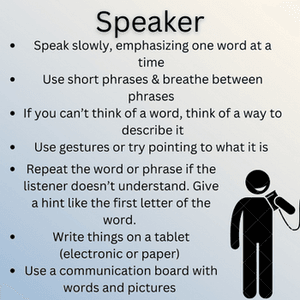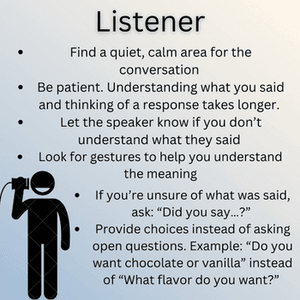Having a conversation with someone requires thinking, using muscles in your mouth, and breathing. All three of these functions are impaired in someone with HD. When these muscles associated with speech aren’t working properly, voices can sound breathy, nasally or harsh, flat and unemotional, and vary between loud and soft volume.
The hardest parts of communication for someone with HD are:
- Understanding what is being said to them. Even if the meaning of each word is understood, when put together in a complex sentence or paragraph, it can get jumbled. Speaking in shorter, easier to understand sentences helps with understanding.
- Starting or responding in a conversation. There may be a long delay before someone answers your question. HD impairs a person’s ability to understand information at a normal rate. However, this doesn’t mean they can’t understand what is being said. It just takes longer. It’s important to give the person with HD plenty of time to respond so that you know what they want. (Check out "Hurry Up and Wait" below)
- Explaining. Thoughts and speech can come out disorganized and sound random or incoherent.
- Speaking Clearly. Slurred speech and changing from speaking softly to loudly are common in HD. Long pauses between words occur more as the disease progresses. People with HD are sometimes accused of being drunk.
When someone has a hard time communicating, they can feel angry, irritable, disorganized, depressed, anxious, and frustrated.
This applies to both the person with HD, and whoever they communicate with. This includes caregivers and families. The best strategies for minimizing everyone’s frustration are:
- Be patient. Allow a person with HD lots of extra time to respond.
- Speak in simple, short sentences.
- Ask questions in a “yes or no”, or “this or that” format instead of open-ended.
- If you can’t understand a word or phrase, ask the person to write it down or write down the first letter.
- Give directions in small steps.
- Keep up conversations with people even if they have lost the ability to speak to you. This helps reduce feeling alone.
- Speech therapy can help people speak more clearly.
- Be empathetic. Ask how someone is feeling instead of guessing.
- State your feelings in plane language. It’s harder for people with HD to understand your facial expressions.
- Focus on one subject at a time.
- Couple or family counseling can provide extra communication practice
- Visit a Speech Therapist or Speech-Language Pathologist to learn strategies for improving voice control. Seeing a speech therapist in the early stages is recommended because their tips will become habits that help as the disease progresses.


Hurry Up & Wait
Jimmy Pollard is well known in the community for his book and presentation titled "Hurry Up & Wait." This is a great opportunity to understand the cognitive changes happening within communication, and how to be more effective and avoid frustration.

